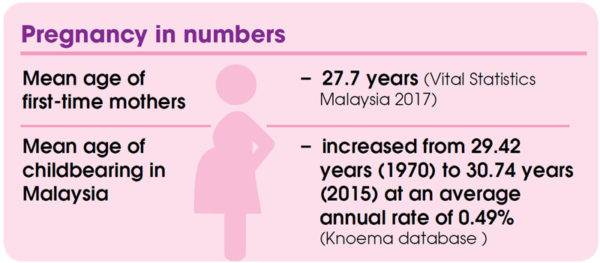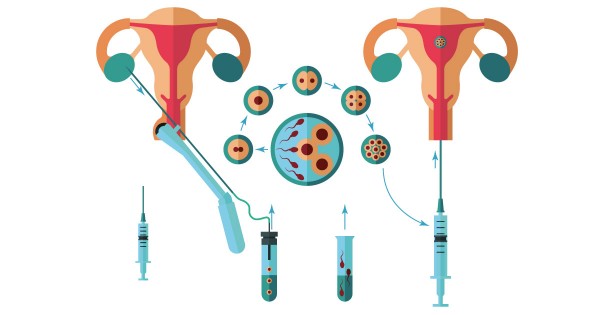People say that age is just a number, but in the case of getting pregnant, it is a significant factor. More couples are deciding to have children at a later age nowadays. The current trend among couples is to focus on career development and financial security first, before taking this huge step in their lives.
Health: Risks and concerns
Many women over the age of 35 have had a healthy pregnancy and given birth to healthy babies, so it is possible and safe for you to start your family later. However, it is still important to understand the risks of getting pregnant when you are older.
Mother: The Royal College of Obstetricians and Gynaecologists (RCOG) recommend 20 to 35 as the optimal age for childbearing. A woman’s fertility decreases as she reaches mid- to late-30s, as her eggs decline in quantity and quality. Thus, it may be harder for you to get pregnant.
Older mothers have higher risks of gestational diabetes and preeclampsia during pregnancy, which can lead to labour complications as well as future health problems in mothers and babies. You are also more likely to get pregnant with twins or triplets as you age, as multiple eggs may be released at the same time due to hormonal changes.
Difficult labour: There is also a higher risk of pregnancy loss. Miscarriage and stillbirth are more common, due to pre-existing medical conditions and decrease in egg quality. When giving birth, a C-section delivery is not uncommon as there are higher possibilities of breech birth, foetal distress, prolonged labour, placenta praevia (placenta blocking the cervix) and other complications
Baby: If you get pregnant when older, there is a higher probability of a preterm baby, or a low birth weight baby due to foetal growth restriction. The baby also has higher risks of chromosomal abnormalities (e.g. Down’s syndrome) or some non-chromosomal birth defects (e.g. abnormal heart).
Father: It will be harder for an older man to get his partner pregnant as testosterone levels and sperm quality tend to decrease with age. Some studies show that older fathers may slightly increase the risk of adverse pregnancy outcomes and health issues in the baby.
However, there is no need to be distressed, as mothers over 35 are still more likely to have a healthy pregnancy despite the increased risks. As long as you are living a healthy lifestyle and taking the necessary steps for the pregnancy, you will be fine. You may have to go for more frequent prenatal visits and tests. Remember to watch your gestational weight gain and avoid harmful substances.
Benefits and challenges
Apart from the health risks, you have to consider other pros and cons of being parents at a later age. Being older, you would be more financially secure and emotionally mature to offer the best nurturing and upbringing to your child.
Your relationship with your partner would also be more stable and settled, hence providing better support for each other in this new journey. The extra life experiences will also prepare you for various challenges ahead.
On the other hand, being late parents presents unique challenges such as being the sandwich generation. You have to divide your time between taking care of your aging parents and your young children. If you have a child earlier, your parents may still be able to help with their grandchildren.
There will also be a much wider generational gap between you and your child due to bigger age differences. It may be tricky to relate to him, especially when he turns into a teenager. Caring for infants and toddlers also takes a lot of energy, and being older may result in exhaustion.
It’s your decision!
Becoming parents is a critical decision in your life. As long as you have done your homework, understand its challenges and are taking steps to ensure a healthy and safe pregnancy, becoming late parents should not be an issue. Consult a health care professional if you are planning for pregnancy and have any concerns. Taking good care of yourself is the best way to take care of your baby.
An educational collaboration with Obstetrical and Gynaecological Society of Malaysia.









Comments